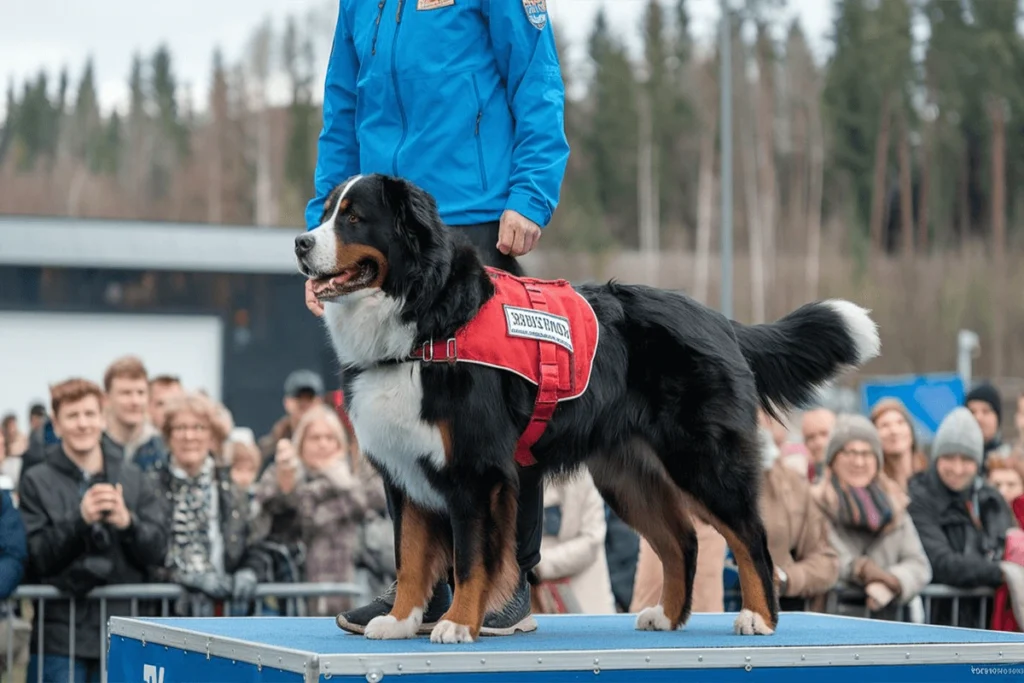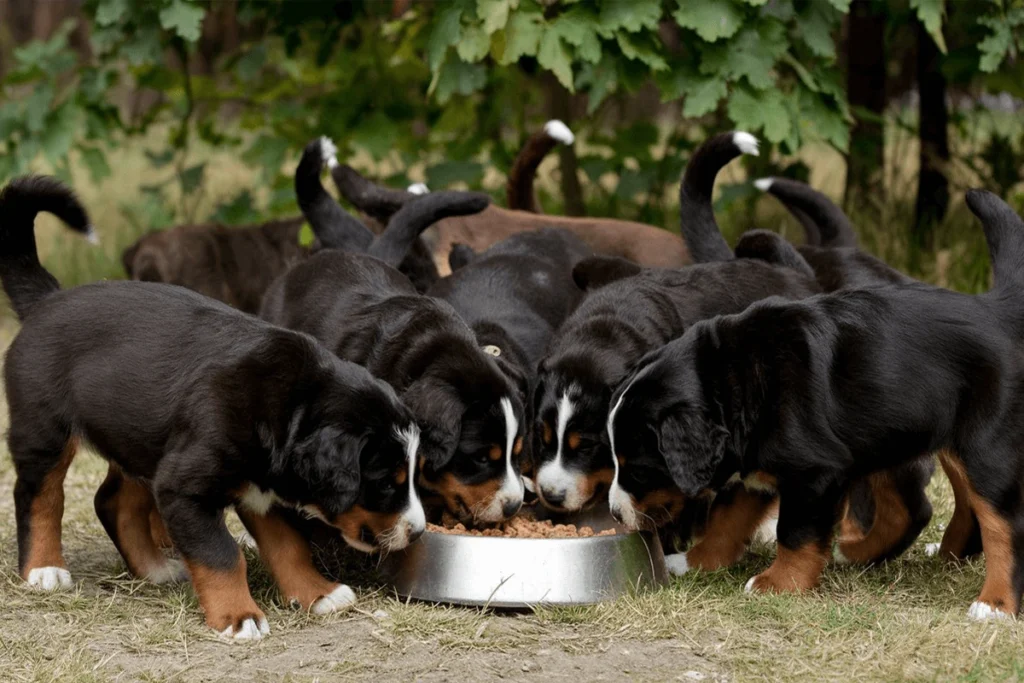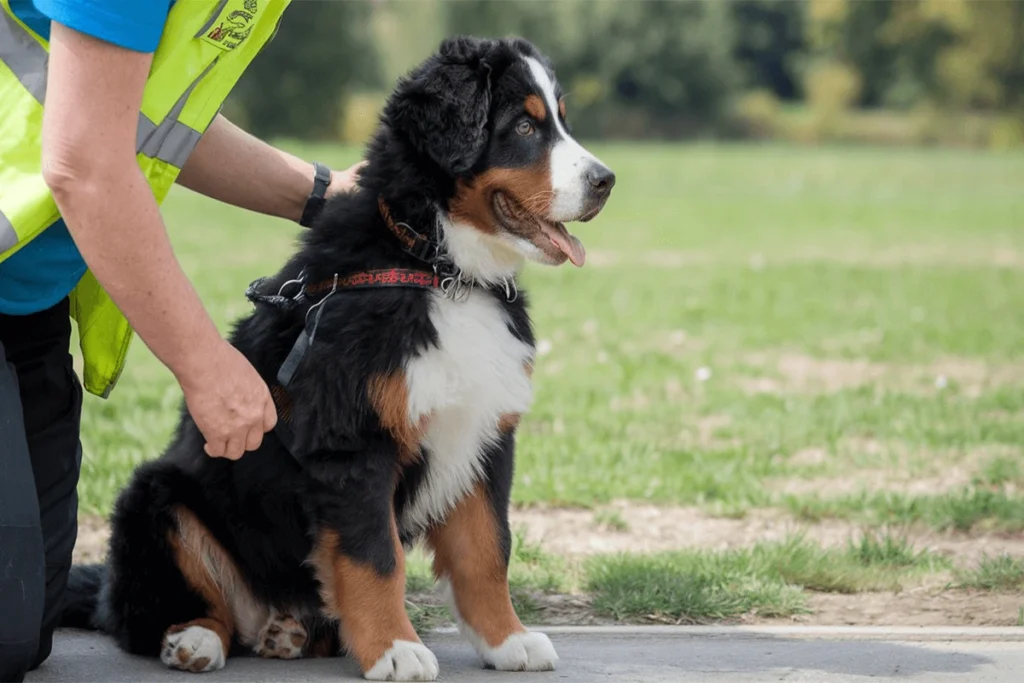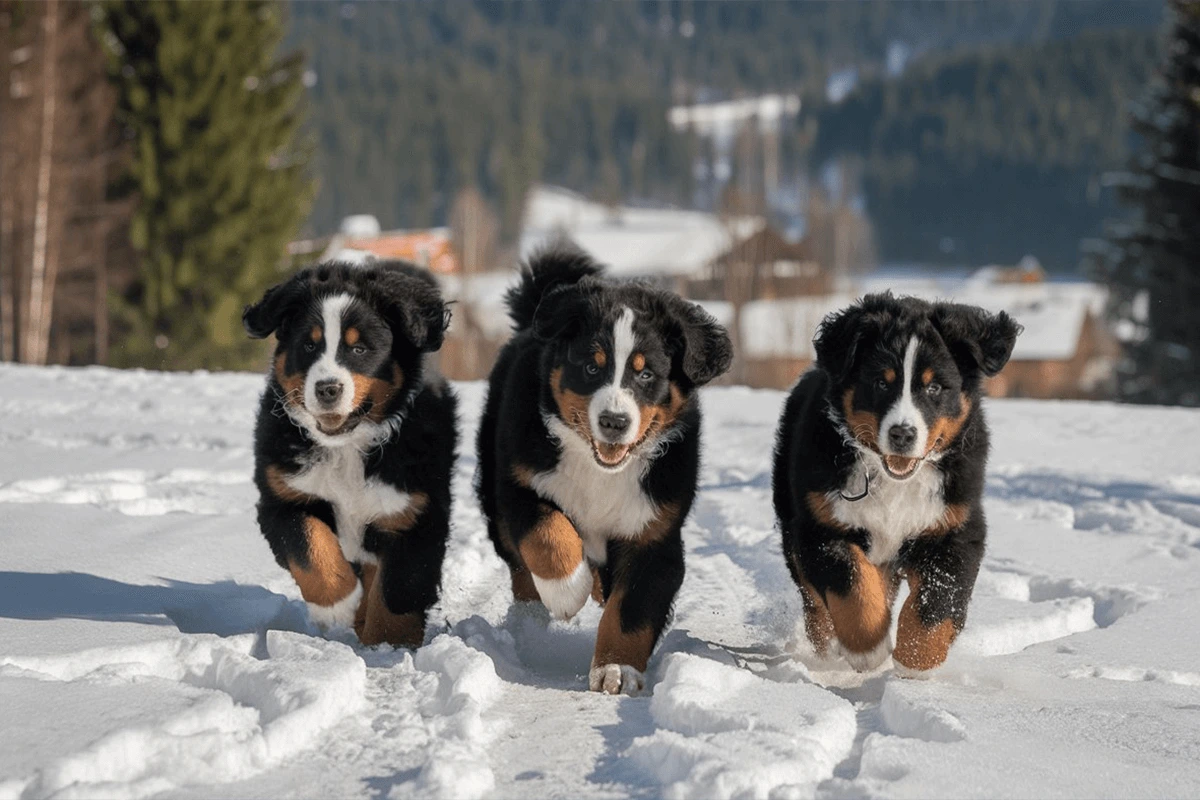Bringing home Bernese Mountain Dog puppies is an exciting and heartwarming experience. These large, lovable dogs, known for their friendly and affectionate nature, quickly become integral members of any household. Originally bred in Switzerland, Bernese Mountain Dogs were working dogs, known for their strength, intelligence, and loyalty. Today, they continue to be cherished for their gentle temperament and family-friendly demeanor.
However, raising Bernese Mountain Dog puppies involves more than just love and affection. Their size and specific needs require a thoughtful approach to ensure they grow into happy, healthy adults. From understanding their nutritional requirements and training methods to providing proper grooming and monitoring for common health issues, every aspect of their care plays a crucial role in their development.

In this comprehensive guide, we will explore the essential aspects of raising Bernese Mountain Dog puppies. Whether you are a first-time dog owner or an experienced pet parent, these insights will help you provide the best possible care for your furry friends. With the right approach, you can ensure your Bernese Mountain Dog puppies thrive, bringing joy and companionship to your life for years to come.
Understanding the Bernese Mountain Dog Breed
History and Origin
The Bernese Mountain Dog is one of four Swiss mountain dog breeds, known collectively as the Sennenhunds. These dogs trace their roots back to the Swiss Alps, where they were bred by farmers to assist with various tasks. Their primary roles included pulling carts, herding cattle, and serving as loyal guard dogs on farms. The breed is thought to have descended from Roman mastiffs brought to Switzerland over 2,000 years ago. Over time, they adapted to the rugged mountain environment, developing strength, resilience, and a calm demeanor. The Bernese Mountain Dog gained popularity in the early 20th century when efforts were made to preserve and promote the breed. Today, they are recognized for their working heritage and are beloved family pets worldwide.
Physical Characteristics
Bernese Mountain Dogs are easily recognizable by their striking appearance and large size. They are a robust and sturdy breed, with males typically weighing between 80 to 115 pounds and females between 70 to 95 pounds. Their most distinctive feature is their thick, tri-colored coat, consisting of black, white, and rust markings. This double coat not only adds to their beauty but also provides insulation, making them well-suited to cold climates. Their broad head, expressive dark brown eyes, and long ears give them a gentle, intelligent look. Despite their large size, they are agile and graceful in their movements, a testament to their working dog ancestry.

Common Traits and Temperament
The temperament of the Bernese Mountain Dog is one of its most endearing qualities. They are known for being gentle, affectionate, and loyal, making them excellent family dogs. They are typically very patient with children and can get along well with other pets. Their calm and friendly nature is coupled with a strong sense of loyalty and protectiveness towards their families. However, like all breeds, they can be prone to separation anxiety if left alone for extended periods. Helping puppies meet different people, other dogs, and new experiences is really important. It helps them become friendly and well-behaved pets as they grow up. Additionally, due to their working dog heritage, Bernese Mountain Dogs are intelligent and eager to please, which makes them relatively easy to train. Their calm disposition combined with their strong work ethic makes them versatile companions, whether as pets, therapy dogs, or even in dog sports.
Nutrition and Feeding Guidelines for Bernese Mountain Dog Puppies
Puppy Nutrition Essentials
Providing the right nutrition is crucial during the early stages of a Bernese Mountain Dog puppy’s life. Their large size and rapid growth rate demand a well-balanced diet that supports healthy development. Puppies need a diet rich in high-quality proteins to build and repair tissues, alongside fats for energy and brain development. Carbohydrates provide additional energy, while vitamins and minerals ensure proper bone growth and immune function. Given their predisposition to joint issues, Bernese Mountain Dog puppies particularly benefit from diets containing glucosamine and chondroitin, which support joint health. Omega-3 fatty acids are also important as they promote a healthy coat and skin. Always ensure fresh water is readily available, as hydration is vital for their overall health. Avoid feeding them human foods or scraps, as certain ingredients can be harmful or even toxic to dogs.
Feeding Schedules and Portion Sizes
Establishing a consistent feeding schedule is essential for Bernese Mountain Dog puppies. Regular meals help regulate their metabolism and energy levels throughout the day. Typically, young puppies should be fed three to four times daily until they are about six months old. Afterward, you can gradually reduce the frequency to two meals per day. The portion size for each meal depends on the puppy’s age, weight, and activity level. It’s important not to overfeed, as Bernese Mountain Dogs are prone to obesity, which can exacerbate health issues like hip dysplasia. Monitoring their body condition regularly and adjusting portion sizes as they grow will help maintain a healthy weight. Consult your veterinarian to determine the ideal portion size for your puppy’s specific needs, ensuring they receive the right amount of nutrients without overeating.

Choosing High-Quality Dog Food
Selecting high-quality dog food is one of the most important decisions for your Bernese Mountain Dog puppy’s long-term health. Look for dog food brands that list meat, poultry, or fish as the first ingredient, indicating a high protein content. Try to stay away from foods that have a lot of fillers like corn, wheat, or soy. These ingredients do not provide much nutrition. Opt for brands that provide clear information about their ingredients and nutritional content. Some Bernese Mountain Dog owners prefer grain-free formulas, especially if their puppies show signs of food sensitivities. Additionally, consider foods that are specifically formulated for large breed puppies, as they contain the right balance of nutrients to support steady growth without putting undue stress on developing joints. If you’re unsure about the best food choice, your veterinarian can recommend brands and formulations that will meet your puppy’s dietary needs.
Training and Socializing Your Bernese Mountain Dog Puppy
Basic Obedience Training
Starting basic obedience training early is essential for Bernese Mountain Dog puppies to grow into well-behaved adults. These puppies are intelligent and eager to please, making them receptive to training. Begin with simple commands like “sit,” “stay,” “come,” and “down.” Keep training sessions short and engaging, as puppies have limited attention spans. Consistency is key, so use the same commands and hand signals each time. Positive reinforcement techniques work best for this breed. Reward your puppy with treats, praise, or play whenever they successfully follow a command. Avoid harsh punishments, as Bernese Mountain Dogs are sensitive and respond better to encouragement. When your puppy learns simple commands, slowly start to teach them harder tricks. Enrolling in a puppy obedience class can also provide structure and socialization, helping your puppy learn in a controlled environment alongside other dogs and owners.
Socializing Your Puppy Early
Socializing your Bernese Mountain Dog puppy from a young age is crucial to ensure they grow into confident, well-adjusted dogs. Introduce your puppy to a variety of people, environments, sounds, and other animals during their formative weeks between 3 and 14 weeks old. Start with low-stress situations, such as meeting friendly family members or calm, well-behaved dogs. Gradually expose your puppy to busier environments like parks or bustling streets to build their confidence. Socialization helps prevent behavioral issues such as fearfulness or aggression. Encourage positive experiences with gentle praise and rewards whenever your puppy remains calm and curious in new situations. If your puppy shows signs of fear, avoid forcing interactions and instead give them time to adjust at their own pace. Proper socialization lays the foundation for a dog that can handle various environments and situations with ease.
Crate Training Tips

Crate training is an invaluable tool for raising Bernese Mountain Dog puppies. It provides them with a safe, comfortable space to retreat and helps with house training and preventing destructive behaviors. Choose a crate that is large enough for your puppy to stand, turn around, and lie down comfortably but not so big that they can eliminate in one corner and sleep in another. Introduce the crate as a positive environment by placing soft bedding and some of their favorite toys inside. Encourage your puppy to enter the crate voluntarily by using treats or feeding them meals near or inside the crate. Start by leaving the crate door open and gradually increase the time your puppy spends inside with the door closed. Never use the crate as a punishment. The goal is for your puppy to view the crate as a safe, relaxing space. With patience and positive reinforcement, your Bernese Mountain Dog puppy will learn to associate the crate with comfort and security, making it a useful tool throughout their life.
Grooming and Health Care for Bernese Mountain Dog Puppies
Grooming Needs and Tips
Proper grooming is essential for maintaining the health and appearance of Bernese Mountain Dog puppies. Their thick, double coat requires regular care to prevent matting and reduce shedding. Brush your puppy’s coat at least two to three times a week using a slicker brush or an undercoat rake to remove loose hair and keep the coat healthy. During shedding seasons in the spring and fall, daily brushing might be necessary to manage the increased hair loss. Bathing should be done as needed, typically every few months, or when the puppy gets particularly dirty. Use a soft dog shampoo so that it does not bother their skin. Don’t forget to check and clean their ears regularly to prevent infections, especially since Bernese Mountain Dogs are prone to ear issues due to their floppy ears. Trim their nails every few weeks to keep them at a comfortable length, and brush their teeth several times a week to maintain oral health. Regular grooming sessions also offer a good opportunity to check for any skin issues or abnormalities that might require veterinary attention.
Vaccinations and Deworming Schedule
Ensuring your Bernese Mountain Dog puppy is up to date on vaccinations and deworming is critical for their health and protection against common diseases. Puppies typically receive their first round of vaccines at around six to eight weeks of age, followed by boosters every three to four weeks until they are about 16 weeks old. Core vaccines include those for distemper, parvovirus, hepatitis, and rabies. Depending on your region and lifestyle, your veterinarian may also recommend non-core vaccines for diseases like Lyme disease, leptospirosis, or Bordetella. Alongside vaccinations, regular deworming treatments help prevent infestations of intestinal parasites such as roundworms, hookworms, and tapeworms, which are common in puppies. Your veterinarian will usually administer deworming medication at the same time as the vaccinations. Following the recommended vaccination and deworming schedule ensures your puppy builds immunity to various diseases and maintains good health as they grow.
Monitoring Common Health Issues
Like all breeds, Bernese Mountain Dogs are prone to specific health issues that require careful monitoring throughout their lives. As puppies, they are susceptible to hip and elbow dysplasia, a condition where the joints develop improperly, leading to arthritis and discomfort later in life. Taking your pet to the vet for regular check-ups and keeping them at a healthy weight can help reduce this risk. Another common concern is bloat, or gastric torsion, a potentially life-threatening condition where the stomach twists. Feeding your puppy smaller, more frequent meals and avoiding vigorous exercise immediately after eating can help reduce the risk. Additionally, Bernese Mountain Dogs are prone to certain cancers, making it important to watch for unusual lumps or changes in behavior as they age. Regular veterinary visits, combined with attentive home care, can help identify and address health issues early, ensuring your puppy leads a happy, healthy life.

Keeping Your Bernese Mountain Dog Puppy Happy and Engaged
Exercise and Playtime Requirements For Bernese Mountain Dog Puppies
Bernese Mountain Dog puppies require a well-balanced routine of exercise and play to ensure their physical and mental well-being. These puppies have a lot of energy, but because they are a large breed, over-exercising can be harmful, especially to their developing bones and joints. When they are young, focus on low-impact activities that help them expend energy without risking injury. Short walks on soft surfaces like grass or dirt are ideal. Avoid long walks or intense play sessions until they are at least 18 months old, as their growth plates need time to fully develop.
Incorporate a variety of activities to keep your puppy engaged. Gentle games of fetch can be great for burning off energy while allowing your puppy to run at their own pace. You can also introduce them to basic agility exercises using simple obstacles, like tunnels or low hurdles, which are fun and stimulating without being too strenuous. It’s important to keep your mind active, just like you keep your body active. This breed is very smart and needs both types of exercise. Engage your puppy in activities that challenge their problem-solving skills, such as scent work or hide-and-seek with their favorite toys or treats. These activities will keep their minds sharp and help prevent boredom, which can lead to destructive behaviors.
Best Toys for Bernese Mountain Dog Puppies
Choosing the right toys for Bernese Mountain Dog puppies is vital to ensure they are entertained and developing healthily. Given their size and strength, you’ll need to select toys that are durable and safe. Chew toys made from tough, non-toxic rubber are ideal for teething puppies and help satisfy their natural urge to chew. Brands like KONG offer toys that can be filled with peanut butter or special treats, which can keep your puppy engaged for extended periods.
Puzzle toys are excellent for mental stimulation. These toys challenge your puppy to figure out how to access hidden treats or move pieces to achieve a goal, which keeps their minds busy and reduces boredom. For interactive play, consider rope toys that are perfect for games like tug-of-war, which can strengthen your bond with your puppy while also providing physical exercise. However, ensure that the rope toys are well-made and monitor them during play to prevent fraying or swallowing of loose threads. Soft plush toys can also be comforting, but due to their powerful jaws, supervise play to ensure they don’t tear them apart and ingest the stuffing or squeakers.
Having a diverse collection of toys can cater to your puppy’s different needs, from chewing to problem-solving, and can help foster their growth and development in a safe and fun way.
Puppy-Proofing Your Home for Safety
Puppy-proofing your home is a crucial step in preparing for your Bernese Mountain Dog puppy’s arrival. These puppies are curious explorers who will investigate every nook and cranny of their new environment. Start by getting down to their level and identifying potential hazards. Small items, such as coins, paperclips, and children’s toys, should be removed or kept out of reach to prevent accidental ingestion. Electrical cords are particularly attractive to puppies and can pose serious risks if chewed. Use cord protectors or reroute cords behind furniture to keep them out of reach.
Secure all cleaning supplies, medications, and chemicals in cabinets that are either too high for the puppy to reach or have child-proof locks. Houseplants can also be a hazard, as some are toxic to dogs. Research the plants in your home and either remove them or place them where your puppy can’t reach. Use baby gates to block off restricted areas, such as staircases, kitchens, or rooms with delicate furniture or decorations.
In the living areas, make sure heavy items like lamps and vases are placed securely to avoid being knocked over during play. In the kitchen, keep trash cans covered or inside cabinets, as puppies may be tempted to explore the contents. Provide your puppy with a designated safe space, such as a playpen or a crate, where they can relax and play without access to household hazards. Regularly inspect your home for new potential dangers as your puppy grows and becomes more curious and adventurous.
You can Learn more about the bernese mountain dog puppies from: PetMD Official
Conclusion
Raising Bernese Mountain Dog puppies is a rewarding experience filled with unique joys and challenges. These loyal, gentle giants are known for their sweet nature. They make exceptional companions for families, singles, and older individuals. By understanding their needs—nutrition, exercise, grooming, and training—you lay the foundation for a happy, healthy dog.
From puppyhood, provide a balanced diet to support their growth. Follow proper feeding schedules, choose quality food, and ensure vaccinations and deworming. Regular exercise and play help maintain their physical health and well-being. Mental stimulation prevents boredom-driven behaviors. Early socialization and consistent training ensure they grow into well-mannered adults.
Grooming is another important part of their care. Their thick fur needs to be brushed often to stop it from getting tangled. Keep up with dental hygiene, ear cleaning, and nail trimming for comfort and health. Puppy-proof your home to ensure safety. These curious pups love to explore and may find hazards if not managed.
Patience, consistency, and love are the cornerstones of raising a Bernese Mountain Dog puppy. They will reward your efforts with loyalty, affection, and companionship. Whether on a walk or relaxing together, your puppy will always offer their gentle nature and love.
With the right care, attention, and training, your Bernese Mountain Dog puppy will grow into a well-behaved, happy, and healthy adult. Every moment with them strengthens your bond and builds a relationship of trust, respect, and love. Invest in their health and happiness now, and you’ll be rewarded with a loyal companion who will bring joy and love for many years to come.
To read more about Bernese Mountain Dogs See THIS“
